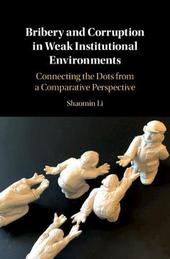
|
Bribery and Corruption in Weak Institutional Environments: Connecting the Dots from a Comparative Perspective
Hardback
Main Details
| Title |
Bribery and Corruption in Weak Institutional Environments: Connecting the Dots from a Comparative Perspective
|
| Authors and Contributors |
By (author) Shaomin Li
|
| Physical Properties |
| Format:Hardback | | Pages:270 | | Dimensions(mm): Height 235,Width 157 |
|
| Category/Genre | Business ethics
International business |
|---|
| ISBN/Barcode |
9781108492898
|
| Classifications | Dewey:382.06 |
|---|
| Audience | | Professional & Vocational | | Postgraduate, Research & Scholarly | |
|---|
| Illustrations |
Worked examples or Exercises
|
|
Publishing Details |
| Publisher |
Cambridge University Press
|
| Imprint |
Cambridge University Press
|
| Publication Date |
16 May 2019 |
| Publication Country |
United Kingdom
|
Description
Drawing on twenty years of research and observations, Li explains how bribery and corruption are carried out in countries with weak institutional environments, and how these activities become globalized. By distinguishing rule-based, relation-based and clan-based governance, this book offers a novel explanation to the age-old puzzle of why some countries thrive despite corruption. It also sheds lights on the symbiotic roles corruption and anticorruption campaigns play in maintaining dictatorships. Applying cost-benefit analysis to different governance environments, Li argues that as non-rule-based economies expand, the transition from relying on private relationships to relying on public rules is inevitable. However, by highlighting the globalization of corruption by non-rule-based countries, this book warns against the potential threats and consequences of bribery by powerful dictatorial governments. This book will appeal to scholars, analysts and graduate students studying corruption, as well as policymakers, business professionals and executives seeking insights into the characteristics of bribery and corruption within different institutional settings.
Author Biography
Shaomin Li is Eminent Scholar and Professor of International Business at Old Dominion University, Virginia. He has published in the Journal of International Business Studies, Harvard Business Review, and The Wall Street Journal, amongst others. In 2008 the Governor of Virginia presented him the Outstanding Faculty Award.
Reviews'Professor Shaomin Li is a leading management scholar who pioneered the use of relation based vs. rule based institutional view of societies and its impact on corruption, bribery, and international business. Li brings his deep knowledge from sociology to show why, how and when bribery and corruption have a negative impact and offers policy suggestions for combating this. It is a must-read for students and scholars of business and economics as well as those interested to have a deep understanding of the phenomenon.' Ilan Alon, Universitetet i Agder, Norway 'Shaomin Li is the world's leading expert on the governance system in weak institutional environments. In Bribery and Corruption in Weak Institutional Environments, he provides an innovative and interesting explanations why bribery and corruption are prevalent in emerging markets and how they affect business, social, and political dynamics. This is a must-read for managers and researchers to understand the behaviors of fast-growing emerging market multinationals.' Sam Park, Willamette University, Oregon 'In Bribery and Corruption in Weak Institutional Environments, Shaomin Li advances an original theory that connects corruption and key institutional variables such as political competition, rule of law, and scope of government. His analysis of the different dynamics in rule-based and relation-based systems is both insightful and thought-provoking. Combining comparative empirical evidence, robust statistical analysis, and a lucid writing style, Li's book is a major contribution to the literature on corruption and its impact on economic activities.' Minxin Pei, author of China's Crony Capitalism 'Using a comparative approach, Li provides a new and insightful analysis of why corruption flourishes in states with weak institutions, how different forms of corruption can differentially impact a state's economic development, and why corruption is widespread despite efforts to control it.' Andy Wedeman, Georgia State University
|